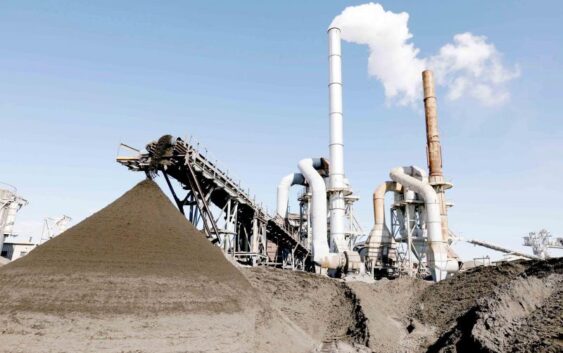- SCZONE SIGNED DEAL WITH CHINESE INVESTORS FOR IRON PRODUCTS PROJECTS IN EGYPT
- WESTPROP HOLDING LIMITED SET TO EMBARKED ON PIPELINE PROJECT IN ZIMBABWE
- FORMER TOGO PLAYER ADEBAYOR LAUNCH SOCIAL HOUSING PROJECT IN TOGO
- AMANSIE WEST DISTRICT ROAD PROJECT BEGINS IN GHANA
- LAGOS TO CALABAR HIGWAY PROJECT: WHY IT CANT BE ACHIEVED
TUNISIA’S STATE OWNED MINING COMPANY ON THE VERGE OF COLLAPSE AS POLITICAL INSTABILITY INTENSIFIES

TUNIS – Tunisia’s state-owned phosphates producer Compagnie des Phosphates de Gafsa, which had been providing Tunisia with 10% of its total exports, is careening towards bankruptcy unless the government steps in to its rescue, a leader of the country’s main trade union said.
“The government must come to the rescue of the Compagnie des Phosphates de Gafsa (CPG). The company’s downward crisis is spiralling,” said Mohamed Sghaier Miraoui, secretary-general of the Gafsa branch of the Tunisian General Labour Union (UGTT).
“CPG’s collapse will be a blow to the region and a blow to the national economy,” he added as he tried to draw the attention of the country’s leaders during presidential and parliamentary election campaigns.
The fortunes of the CPG and the slump of the output of the key phosphates commodity create an illustration of Tunisia’s efforts to balance its experiment with full-fledged democracy and economic growth.
Recovery of the economy has been hampered by demands to increase salaries, end poverty and provide enough jobs despite GDP growth of about 1%.
“Solutions exist to the crisis of the CPG if there is concern and goodwill at the political level to think fast and deliver quickly on these solutions,” Miraoui said. “We are raising the alarm as the clock is ticking and we will all rue the time of our inaction if the CPG collapses.”
Miraoui’s plea came after the UGTT called on the authorities “to accelerate the implementation of measures of rescue of the company.”
To placate a restive region, the government increased the CPG workforce, which narrowed the firm’s ability to modernise its production system and catch up with rival producers abroad vying for world market shares and long-term buyers.
CPG has recruited 21,000 new employers since 2011, putting its workforce at 30,000, many of them said to be ghost jobs.
Its hiring spree was aimed at calming protests to fuel the country’s transition but unrest continued to erupt with each new hiring as more of the unemployed clamoured to be hired.
Security forces had to intervene last May to pull down a tent erected by protesters on train tracks used to ship phosphates through Menzel Bouzaiane outside Gafsa. The protest was a continuation of demands for jobs and other benefits.
The Tunisian Army is supposed to protect facilities linked to phosphates, gas and oil production against disruption but the government, mindful of social stability, shied away from cracking down on protests and leaned on GPG to hand out more jobs, giving new incentives for the protests to continue.
Phosphates output has been shrinking in Tunisia since 2011 and CPG’s losses have accumulated as the wage bill expanded.
CPG spends nearly 30% of its $180 million annual budget on salaries, official figures show. It has lost almost $1 billion a year since 2011 because of disruptions caused by the protests.
The protests slashed CPG’s normal production of 14,000 days a year at its five producing mines to an average of 4,500 production days, official data indicate.
Protests blocking trains transporting phosphates cause the CPG to more than triple its transport costs. A tonne of phosphates costs $3 to transport by train but when the tracks are blocked by protesters CPG must use truckers who charge up to $10 a tonne.
As result, Tunisia’s phosphates output slumped from 8 million tonnes in 2010, accounting for the main earner of foreign currency revenues, to 3.3 million tonnes in 2018, 25% lower than in 2017.
Output for the first four months of this year was 1.3 million tonnes compared to 800,000 tonnes in the same period last year, data showed.
Because of the drop in phosphates production, olive oil replaced phosphates as Tunisia’s top export earner in 2018. The phosphates industry export share shrank to about 4% from 10% before 2011.
Source: Arab Weekly

